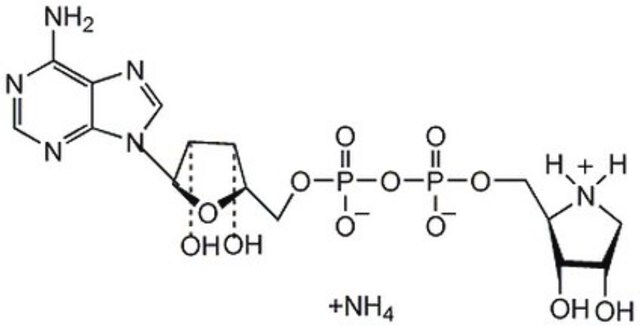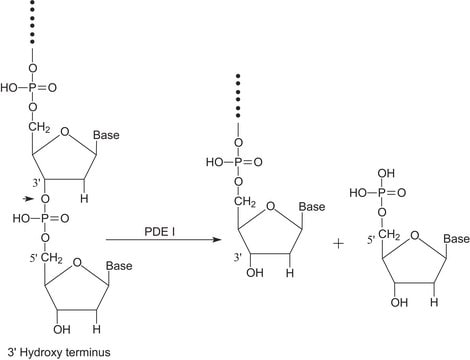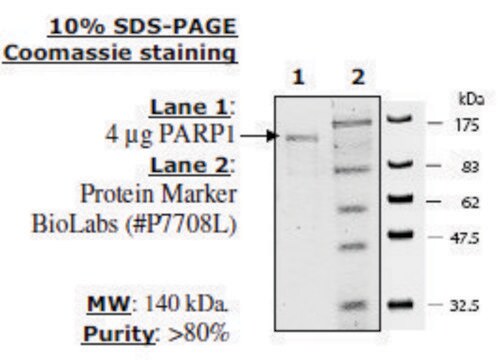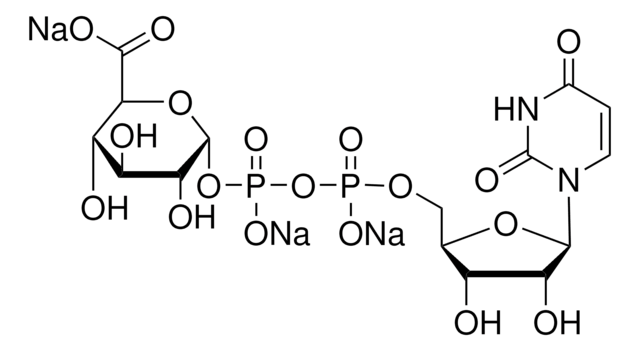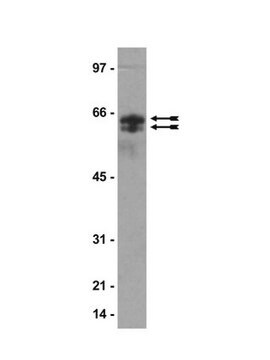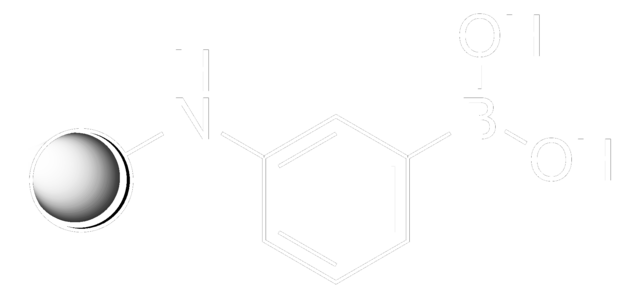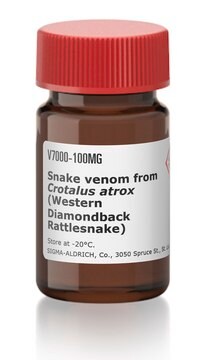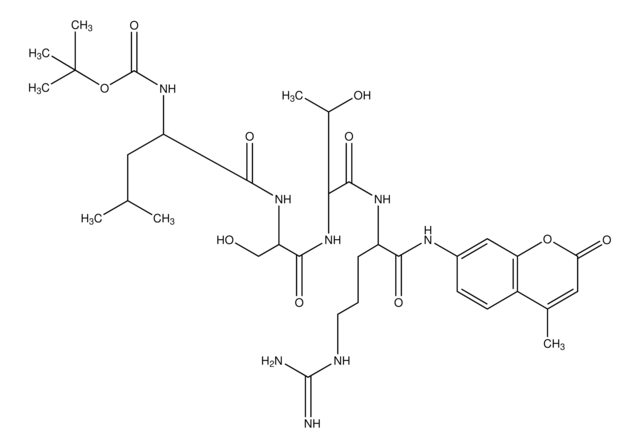おすすめの製品
由来生物
human
リコンビナント
expressed in Sf21 cells
タグ
His tagged
アッセイ
>95% (SDS-PAGE)
形状
liquid
分子量
~110 kDa by SDS-PAGE
包装
pkg of 2 μg
濃度
≥0.2 mg/mL
テクニック
cell based assay: suitable
色
clear
溶解性
water: soluble
UniProtアクセッション番号
輸送温度
dry ice
保管温度
−70°C
遺伝子情報
human ... PARG(8505)
詳細
Research area: Cell signaling
アプリケーション
PARG human has been used in the digestion of sciatic nerve sections, in co-immunoprecipitation, in in vitro glycohydrolase activity assay
生物化学的/生理学的作用
Poly(ADP-ribose) glycohydrolase(PARG) hydrolyzes poly(ADP-ribose) at glycosidic(1′′-2′′) linkage of ribose-ribose bond to produce free ADP-ribose. It is an endo- and exo-glycosidase. PARG plays arole in DNA repair and replication. Inhibited or depleted PARG in cells aremore prone to DNA-damaging agents. PARG also averts the accumulation of PAR inthe cytoplasm and parthanatos, a caspase-independent PAR-mediated type of celldeath.
物理的形状
Solution in 50 mM TRIS-HCl, pH 7.5, containing 100 mM sodium chloride, 0.2% NP-40, 50 mM imidazole and 10% glycerol.
その他情報
Human PARG is fused to a His-tag.
シグナルワード
Danger
危険有害性情報
危険有害性の分類
Repr. 1B
保管分類コード
6.1D - Non-combustible acute toxic Cat.3 / toxic hazardous materials or hazardous materials causing chronic effects
WGK
WGK 1
引火点(°F)
Not applicable
引火点(℃)
Not applicable
適用法令
試験研究用途を考慮した関連法令を主に挙げております。化学物質以外については、一部の情報のみ提供しています。 製品を安全かつ合法的に使用することは、使用者の義務です。最新情報により修正される場合があります。WEBの反映には時間を要することがあるため、適宜SDSをご参照ください。
労働安全衛生法名称等を通知すべき危険物及び有害物
名称等を通知すべき危険物及び有害物
Jan Code
SRP8023-2UG:
試験成績書(COA)
製品のロット番号・バッチ番号を入力して、試験成績書(COA) を検索できます。ロット番号・バッチ番号は、製品ラベルに「Lot」または「Batch」に続いて記載されています。
Sara C Larsen et al.
Cell reports, 24(9), 2493-2505 (2018-08-30)
ADP-ribosylation (ADPr) is a reversible posttranslational modification involved in a range of cellular processes. Here, we report system-wide identification of serine ADPr in human cells upon oxidative stress. High-resolution mass spectrometry and unrestricted data processing confirm that serine residues are
Jeannette Abplanalp et al.
Nature communications, 8(1), 2055-2055 (2017-12-14)
ADP-ribosylation is a posttranslational modification that exists in monomeric and polymeric forms. Whereas the writers (e.g. ARTD1/PARP1) and erasers (e.g. PARG, ARH3) of poly-ADP-ribosylation (PARylation) are relatively well described, the enzymes involved in mono-ADP-ribosylation (MARylation) have been less well investigated.
Sara C Buch-Larsen et al.
Cell reports, 32(12), 108176-108176 (2020-09-24)
ADP-ribosylation (ADPr) is a post-translational modification that plays pivotal roles in a wide range of cellular processes. Mass spectrometry (MS)-based analysis of ADPr under physiological conditions, without relying on genetic or chemical perturbation, has been hindered by technical limitations. Here
Xiao-Nan Zhang et al.
Nature communications, 10(1), 4196-4196 (2019-09-15)
Nicotinamide adenine dinucleotide (NAD+)-dependent ADP-ribosylation plays important roles in physiology and pathophysiology. It has been challenging to study this key type of enzymatic post-translational modification in particular for protein poly-ADP-ribosylation (PARylation). Here we explore chemical and chemoenzymatic synthesis of NAD+
Michelle Schacke et al.
International journal of molecular sciences, 20(3) (2019-01-30)
Poly- adenosine diphosphate (ADP)-ribose (PAR) is a polymer synthesized as a posttranslational modification by some poly (ADP-ribose) polymerases (PARPs), namely PARP-1, PARP-2, tankyrase-1, and tankyrase-2 (TNKS-1/2). PARP-1 is nuclear and has also been detected in extracellular vesicles. PARP-2 and TNKS-1/2
ライフサイエンス、有機合成、材料科学、クロマトグラフィー、分析など、あらゆる分野の研究に経験のあるメンバーがおります。.
製品に関するお問い合わせはこちら(テクニカルサービス)